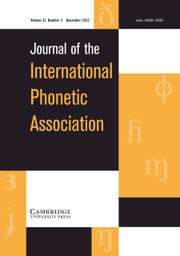Article contents
Hausa
Published online by Cambridge University Press: 06 February 2009
Extract
The following description of Hausa is based on the variety of the language spoken in Kano, Nigeria. The sample text is transcribed from a recording of a male native of Kano in his late 30's. This variety of Hausa is considered “standard”. Though Kano is a large urban center with some internal variation in speech, the sound inventory is relatively homogeneous within the city and surrounding area. Kano Hausa is the variety most commonly heard on national and regional radio and television broadcasts in Nigeria as well as most international broadcasting, such as the BBC, Deutsche Welle, Radio Moscow, and Voice of America. Kano Hausa is therefore familiar throughout the Hausa speaking areas of Nigeria as well as Hausa speaking communities in Niger, Ghana, and other areas outside northern Nigeria. Hausa has a standard orthography, in use since the 1930's and also based on the Kano variety. It is familiar to all Hausa speakers literate in the Romanized orthography. (Many Hausas are also literate in Arabic orthography, a variety of which has been used to write Hausa, probably for several centuries. The Arabic orthography for Hausa is less standardized than the Roman orthography and has little formally published literature.)
- Type
- Phonetic Representation Illustrations of the IPA
- Information
- Journal of the International Phonetic Association , Volume 23 , Issue 2 , December 1993 , pp. 77 - 82
- Copyright
- Copyright © Journal of the International Phonetic Association 1993
References
- 2
- Cited by




